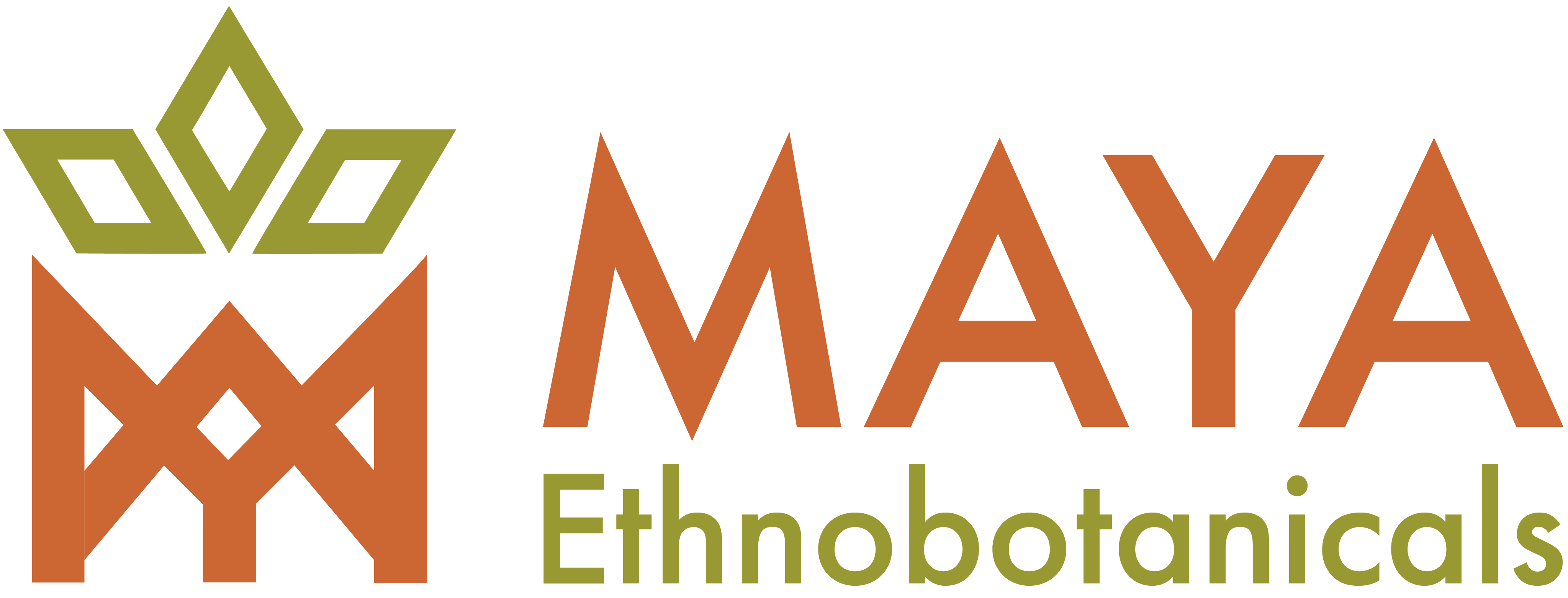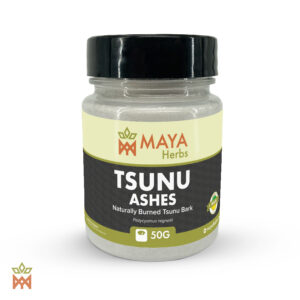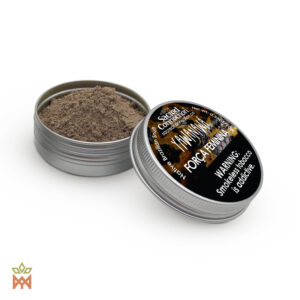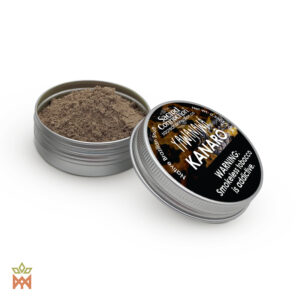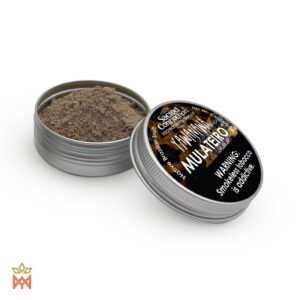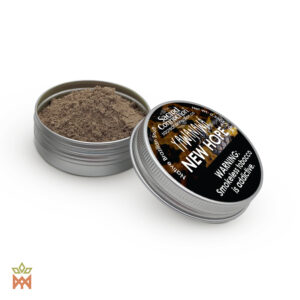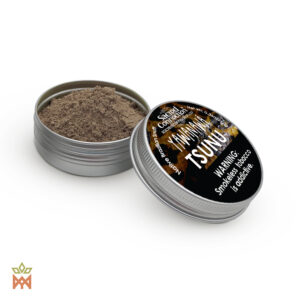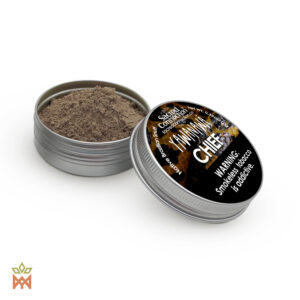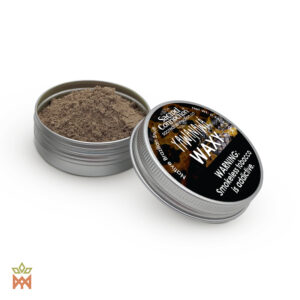Showing all 8 results
- Price range: € 20,00 through € 90,00 Incl. VATSelect options This product has multiple variants. The options may be chosen on the product page
- € 20,00 Incl. VATSelect options This product has multiple variants. The options may be chosen on the product page
- € 20,00 Incl. VATSelect options This product has multiple variants. The options may be chosen on the product page
- € 20,00 Incl. VATSelect options This product has multiple variants. The options may be chosen on the product page
- Price range: € 20,00 through € 90,00 Incl. VATSelect options This product has multiple variants. The options may be chosen on the product page
- € 20,00 Incl. VATSelect options This product has multiple variants. The options may be chosen on the product page
- € 20,00 Incl. VATSelect options This product has multiple variants. The options may be chosen on the product page
Showing all 8 results
Maya and the Yawanawa Tribe: A Partnership Rooted in Tradition
For over 13 years, Maya has been honored to work closely with the Yawanawa tribe, a relationship built on mutual trust, friendship, and shared respect for their rich cultural heritage. The foundation of this collaboration is Biraci Brasil, the chief of the Yawanawa, who has been instrumental in revitalizing their culture and spiritual practices after the decline of the rubber boom. Biraci is a recognized activist for indigenous rights and a staunch defender of the Amazon rainforest.
Chief Biraci Brasil
Together, Maya and the Yawanawa have developed sustainable economic initiatives, particularly through the sale of Rapéh, a sacred snuff used in shamanic rituals. Our partnership extends to several key figures within the tribe, including Biraci’s daughter, Nawashahu, who crafts the Força Femina (Feminine Force) Rapéh, and her husband, Peu Yawanawa, who creates the New Hope Rapéh. We also collaborate with Shaneihu, a renowned medicine man and musician, whose famous CD Kanaro inspired the Kanaro Rapéh, named after an important tribal legend. Beyond these individuals, our work benefits many other members of the tribe, directly and indirectly, fostering economic resilience and cultural preservation.
Agroforestry
Years ago, Maya and Biraci launched an agroforestry project in Yawanawa territory, planting Açai, banana, and coconut trees. This initiative has continued for years, supporting sustainable land use and the protection of their 200,000-hectare tribal reserve. Our shared commitment to preserving the Yawanawa’s indigenous culture and safeguarding their natural environment grows stronger with each passing year.
Who Are the Yawanawa?
The Yawanawa tribe, indigenous to the Amazon rainforest in Brazil, holds a deep cultural heritage rooted in spirituality and shamanic traditions. Residing in the state of Acre, the Yawanawa territory spans vast areas of pristine rainforest, where they have lived in harmony with nature for centuries. Their cultural practices revolve around a profound reverence for the interconnectedness of all living beings, with shamans playing a central role in guiding the community through spiritual and healing rituals.

Yawanawa Culture
Spiritual Beliefs and Practices
The Yawanawa people’s spirituality is deeply connected to the forest, which they consider sacred. Shamans, known as pajés, act as intermediaries between the physical and spiritual worlds, using sacred plant medicines like Ayahuasca and Rapé to maintain the community's spiritual health and balance. These rituals foster healing, insight, and a deeper connection to the universe.
Traditional Rituals and Festivals
Yawanawa culture is rich in traditional rituals, with festivals such as the Mariri Festival being central to their spiritual life. During this festival, Ayahuasca is consumed to promote healing, strengthen community bonds, and facilitate spiritual revelations. The Yawanawa use traditional body paints, dance, and singing to celebrate their connection to nature and their ancestors.
Art and Craftsmanship
Yawanawa artisans are known for their intricate basketry, beadwork, and feather ornaments, all of which reflect their deep connection to the natural world. These crafts serve both ceremonial purposes and as a source of income, allowing the tribe to share their cultural heritage while supporting their community.
Yawanawa Rapé
Rapé snuff tobacco holds a significant place in Yawanawa shamanic traditions, serving as a powerful tool for spiritual cleansing, healing, and connection to the divine. Made from a blend of tobacco leaves and various medicinal herbs, Rapé is meticulously prepared by the tribe’s shamans according to ancient recipes and rituals.
Rapé application
The process of preparing Rapé is a sacred ceremony in itself, involving prayers, chants, and offerings to the spirits of the plants. The tobacco leaves are ground into a fine powder and mixed with other botanical ingredients, such as tree barks, seeds, and aromatic resins, each chosen for its specific healing properties.
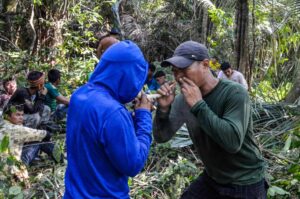
During shamanic ceremonies, the Yawanawa shamans administer Rapé to participants using a special blowpipe called a Tepi. The shaman blows the powdered mixture into the nostrils of the recipient, inducing a powerful and purifying effect on both the physical and energetic levels. The intense sensation of the Rapé facilitates deep introspection, emotional release, and spiritual insight.
Rumã
Rapé is believed to cleanse the mind, body, and spirit of negative energies, blockages, and impurities, allowing for greater clarity, balance, and alignment with one’s true essence. It is often used to alleviate physical ailments, clear mental fog, and heighten spiritual awareness, making it an integral part of Yawanawa healing rituals and ceremonies.
In addition to its therapeutic properties, Rapé also plays a central role in Yawanawa social and cultural gatherings, where it is shared among community members as a symbol of unity, reciprocity, and collective healing. The act of receiving Rapé from a shaman is considered a sacred blessing and an expression of trust and mutual respect.
For the Yawanawa tribe, Rapé snuff tobacco represents not only a potent medicine but also a profound spiritual ally and teacher. Through their continued practice of shamanic rituals and their reverence for the sacred plant medicines of the Amazon, the Yawanawa people honor their ancestors, preserve their cultural heritage, and forge a deeper connection to the natural world.
Yawanawa Diets and Spiritual Practices
The Yawanawa have a rich tradition of shamanic initiation, which involves specific diets aimed at spiritual purification. Two prominent practices are the Muka and Ayahuasca (Uni) traditions.

Muka Diet
The Muka diet is a fundamental aspect of Yawanawá shamanic initiation, focusing on the cultivation and refinement of spiritual power known as Muka. Muka is believed to be a potent force that enables shamans to heal, divine, and communicate with the spirit world. During the Muka diet, initiates undergo a period of isolation and fasting, during which they consume only specific plants and adhere to strict dietary restrictions.
Central to the Muka diet is the consumption of a sacred plant known as Muka, which is believed to bestow spiritual strength and insight upon the initiate. The Muka plant is ingested in various forms, including as a tea or powder, and is often accompanied by other medicinal plants chosen for their purifying and visionary properties.
Throughout the duration of the Muka diet, initiates abstain from certain foods, behaviors, and social interactions considered impure or distracting. This period of isolation allows them to focus their energy inward, deepening their connection with the spiritual realm and preparing them for their role as shamans within the community.
The Muka diet is typically overseen by experienced shamans or elders within the Yawanawá tribe, who provide guidance, support, and spiritual teachings to the initiates throughout the process. It is believed that successful completion of the Muka diet grants initiates the spiritual authority and power necessary to fulfill their role as healers and guardians of Yawanawá tradition.
Ayahuasca or Uni Tradition
Another important aspect of Yawanawá shamanic initiation is the tradition of working with Ayahuasca, a sacred plant medicine revered for its transformative and visionary properties. Known as Uni in the Yawanawá language, Ayahuasca is considered a powerful ally in the journey of spiritual awakening and shamanic initiation.

Initiates undergo rigorous training and preparation before participating in Ayahuasca ceremonies, which are typically led by experienced shamans or spiritual leaders within the tribe. During these ceremonies, participants ingest the Ayahuasca brew, allowing its psychoactive compounds to induce profound states of consciousness and spiritual revelation.
Ayahuasca ceremonies are deeply ingrained in Yawanawá culture, serving as occasions for healing, divination, and communion with the spirit world. Through the visionary experiences facilitated by Ayahuasca, initiates gain insights into their spiritual path, receive guidance from ancestral spirits, and confront personal challenges and traumas.
In addition to its role in shamanic initiation, Ayahuasca is also used therapeutically within the Yawanawá community, offering relief from physical ailments, emotional distress, and spiritual malaise. The plant’s healing properties are believed to extend beyond the individual to the collective, fostering unity, harmony, and balance within the tribe.
Overall, the Muka and Ayahuasca traditions are integral components of Yawanawá shamanic initiation, providing initiates with the tools, teachings, and experiences necessary to embody their role as spiritual leaders and healers within the tribe. Through these sacred practices, the Yawanawá continue to uphold their ancient traditions, honor their ancestors, and cultivate a deep connection with the natural world.
Challenges and Modern Adaptations
Despite the richness of their culture, the Yawanawa face challenges due to deforestation, land disputes, and external pressures. In response, they have become advocates for indigenous rights and environmental conservation. Through modern partnerships and collaborations with organizations like Maya, the Yawanawa continue to share their culture globally while adapting to contemporary challenges, ensuring the preservation of their traditions and their rainforest home.
The Yawanawa’s ability to blend traditional practices with modern strategies exemplifies their resilience and determination to protect their cultural and natural heritage for future generations.
https://www.youtube.com/watch?v=vYuRUR362Cw&ab_channel=NawashahuYawanawa
Buy Yawanawa Rapé
At Maya, we proudly offer the finest Yawanawa Rapé, sourced directly from our trusted partners within the Yawanawa tribe. With over a decade of collaboration, we guarantee the highest quality, ensuring that every batch is always fresh and crafted with care. Our Yawanawa Rapé is available at competitive prices, making it accessible without compromising on its authenticity or potency. When you buy Yawanawa Rapé from Maya, you are not only receiving a superior product but also supporting the sustainable practices and cultural preservation of the Yawanawa people.
Final words
Maya’s long-standing collaboration with the Yawanawa tribe, under the leadership of Chief Biraci Brasil, has created a partnership that goes beyond commerce. Together, we are building sustainable projects, preserving indigenous knowledge, and protecting the Amazon rainforest. Through our shared efforts, the Yawanawa continue to thrive, balancing tradition with modern challenges, and sharing their profound cultural heritage with the world.
